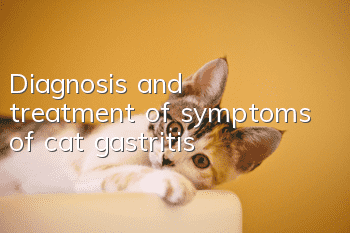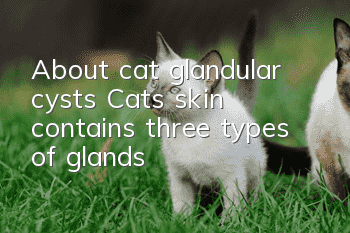Diagnosis and treatment of symptoms of cat gastritis

Diagnostic methods for cat gastritis
Feline gastritis is a common gastrointestinal disease in cats. Cats present with vomiting, food refusal, etc. Since the symptoms of many cat diseases are vomiting, as owners, how should we identify cat gastritis?
Feline gastritis is an acute inflammation of the gastric mucosa and is a common disease in cats and other small animals. The main cause is that cats overeat, or eat putrefactive food and indigestible bones, hair, plastic products, etc., which irritate the gastric mucosa and cause inflammation; taking certain irritating drugs or accidentally ingesting chemical substances are also causes of cat gastritis. Certain infectious diseases and parasitic diseases can also cause gastritis. The sick cat suffered from vomiting, depression and abdominal pain. Feeling thirsty, but vomiting occurs after drinking water. If gastritis is caused by corrosive agents, the vomitus may contain blood and gastric mucosal fragments. Sick cats refuse to eat or have pica, and appear uneasy due to abdominal pain. Dehydration may occur. The sick cat violently resists, feels restless and whines when its stomach is touched.
Treatment methods for cat gastritis
Cat gastritis is generally caused by cats accidentally eating rotten or spoiled feed that is not easy to digest, or overeating. Of course, there are also other reasons that inflame the cat's gastric mucosa and intestinal mucosa. So how to treat cat gastritis?
The basic principles of treating cat gastritis are to remove irritating factors, provide measures to promote mucosal recovery, and correct dehydration. First of all, the diet should be restricted and a small amount of sugar, salt and rice soup should be fed, in small amounts many times. Feed high-sugar, low-fat, low-protein, easily digestible liquid food. Anticholinergic drugs can reduce gastric motility and spasm, reduce the excitation of parasympathetic nerves in the smooth muscle of the gastric wall, reduce gastric acid secretion and relieve vomiting. 5% glucose saline can be given, 40 to 60 ml per kilogram of body weight per day. To replenish lost body fluids. For general gastritis, take metoclopramide tablets orally, 2 to 3 times a day, 0.5 mg per kilogram of body weight each time. At the same time, streptomycin is injected intramuscularly, twice a day, 10 mg per kilogram of body weight each time, and the oral dosage should be increased as appropriate.
- Female cat urinates little and frequently but is mentally normal
- Why are two cats howling at each other?
- The two-month-old kitten weighs just over a pound
- Can cats really eat raw meat? What issues need attention
- Why is the Pug not eating, drinking or moving?
- How to train a cat to shake hands? How to train a cat to shake hands and say hello!
- Pay attention to the smell after raising a cat
- Several tips and precautions for cat training, a must-read for novice cat training and cat raising!
- Can cats eat cat grass every day?
- What are the symptoms of a cat allergic to flowers?



